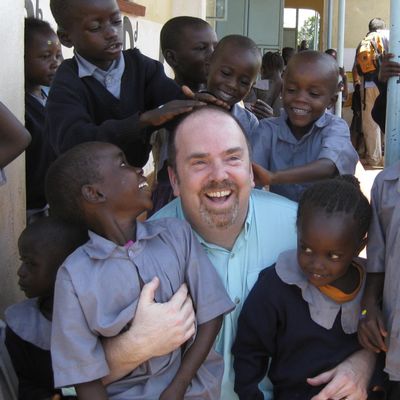Parents adopting children to see higher fees, new rules

NEW YORK – The U.S. government has raised fees and made a series of regulatory changes recently for American families adopting children overseas, fueling resentment toward the State Department among agencies who fear further reductions in the already dwindling number of foreign adoptions.
The number of foreign children adopted by U.S. parents has plummeted steadily since a peak of 22,884 in 2004. The total for the 2016 fiscal year was 5,372, a decrease of more than 76 percent.
The National Council for Adoption, which represents scores of adoption agencies, is leading a campaign against the new fees. They were announced Feb. 1 as part of broader changes in how the agencies offering international adoptions undergo a required accreditation process.
Chuck Johnson, the council’s CEO, said the new policies will make adoptions too costly for many families and force agencies out of business “due to the burdensome costs of maintaining accreditation.”
The ranks of international adoption agencies in the U.S. already has dropped from more than 200 a decade ago to about 160 now.
Many of the remaining agencies are faith-based, and view adoption as a means of carrying out a Christian mission. Leaders of some of these agencies have voiced frustration over their strained dealings with the State Department under President Donald Trump at a time when several other departments in the White House are taking steps welcomed by Christian evangelicals.
The process for American families seeking to adopt foreign children has been surrounded by turmoil lately.
Corruption scandals have led to suspensions of adoptions from a few countries, contributing to the drop in international adoptions. In China, which accounts for the most children adopted in the U.S., the numbers have plummeted as more Chinese people adopt domestically. Russia used to account for hundreds of U.S. adoptions a year, but has halted them due to political strains.
In November, the organization that oversaw the accreditation process for nearly a decade, the New York-based Council on Accreditation, announced it was withdrawing from that role after a public exchange of differences with the State Department.
The State Department said its most recent performance review of the council revealed “numerous concerns and deficiencies,” including alleged laxity in enforcing regulations governing the adoption agencies’ foreign employees and partners.
The council, in turn, accused the State Department of unilaterally altering their business agreement and pushing for fee increases.
“This will have a chilling effect on families coming forward to engage in the process,” said Richard Klarberg, the Council on Accreditation’s president.
Officials of several leading adoption agencies said they respected Klarberg’s council and were sorry to see it relinquishing its duties.
Klarberg says his organization handled the adoption dossier with a full-time staff of four, making use of volunteers from the adoption industry to help carry out its investigations in a collegial manner. The State Department has recruited a brand-new agency, the Intercountry Adoption Accreditation and Maintenance Entity (or IAAME), to take over from Klarberg’s council; it is expected to have a bigger budget and a staff of at least 20 to carry out a more aggressive regimen of investigations.
Suzanne Lawrence, the State Department’s special adviser for children’s issues, said the new fees were necessary to fund those activities.
“Monitoring and oversight of the intercountry adoption process today is critical to ensuring that families and children are protected and that safe and ethical adoptions continue in the future,” she said in an email.
Adoptions require rigorous scrutiny largely because of corruption that has surfaced in various ways. An Ohio-based adoption agency recently was shut down due to allegations it charged families for services it did not provide. Overseas, there have been scandals involving bribery, false documents and baby-selling.
Estimates vary widely as to how much adoption agency costs might rise under the new State Department policies. Most of those providing input to the Associated Press said accreditation-related costs would at least double, and they worried a new nonrefundable fee of $500 for prospective adoptions – which would be passed on to parents – would be a deterrent for some families.
The State Department noted the new fee would represent less than a 1.5 percent increase for families whose foreign adoptions cost more than $35,000. However, Johnson said the burden on families could worsen as other new accreditation-related costs also are passed on.
Totaled up, the $500 fees are expected to generate more than $2 million in annual revenue for IAAME. Klarberg said that far exceeded the Council on Accreditation’s typical annual budget.
Greg Eubanks, CEO of a large adoption agency known as WACAP, said he was dismayed that the fee increase was imposed without an opportunity for public comment.
“We all have confusion,” he said. “It feels like it’s being rushed.”
He said agencies might face other higher costs due to being billed by IAAME for travel and per diem expenses related to a beefed-up regimen of on-site inspections in the U.S. and overseas.
WACAP – based in Renton, Washington – processed more than 300 international adoptions in 2010, Eubanks said. That number has dropped to about 170 – mostly children with special medical or psychological needs.
“For some of these kids, this is a life-and-death issue,” he said.
Critics of the new policies are puzzled why the State Department is tightening regulation of international adoptions at a time when the administration is deregulating other sectors.
“We’re hopeful Congress and the administration will take a look at this issue and confirm if this is the direction they want to go – a direction that I believe will virtually end intercountry adoption as an option for U.S. families,“ he said.